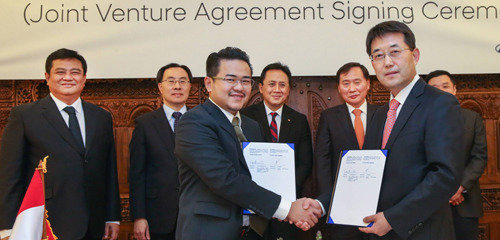Hyundai Motor to establish a joint venture in Indonesia
Hyundai Motor to establish a joint venture in Indonesia
Posted December. 13, 2017 08:26,
Updated December. 13, 2017 08:50

Hyundai Motor will establish a joint venture in Indonesia to branch into the Southeast Asian market and foster a new growth engine. Indonesia is the largest auto market in Southeast Asia, where Japanese carmakers remain the dominant players.
The Korean automobile giant signed a joint venture agreement with Artha Graha (AG) Tuesday at the Indonesian embassy in Korea. The joint venture between Hyundai and AG, the 10th largest company in Indonesia and the parent company of the reseller of Hyundai’s commercial vehicles, will be set up in Jakarta in May.
The new joint venture will manufacture commercial vehicles, such as medium and large-sized trucks, in the facilities owned by the AG Group. Fully disassembled items shipped from Hyundai will be assembled by the joint venture in a Completely Knocked Down (CKD) form. The joint venture will not only be responsible for assembly but also for sales and after-sales service. This means Hyundai Motor will directly engage in local sales and marketing.
Indonesia is a key market for Hyundai’s expansion into the Southeast Asian market. According to the Korea Trade-Investment Promotion Agency (KOTRA), Indonesia has the largest automobile market size in the region with 1.11 million units of cars sold every year.
Korean carmakers are still less known in the Southeast Asian market. Hyundai has chosen to export its vehicles in the form of CKD as it could be risky to set up a complete vehicle plant in the first place that requires many components makers. By doing so, the automaker can also save cost as Indonesia has zero tariffs for imported car components.
Taking this opportunity, Hyundai Motor is planning to aggressively expand into the Southeast Asian market. Starting from next year, members of the Association of Southeast Asian Nations (ASEAN) will completely eliminate tariffs on ASEAN-imported vehicles. This means automobiles manufactured in Indonesia would not be imposed any tariffs when exported to Vietnam. Until now Vietnam has been an exception in this move but its government is aiming to scrap car tariffs on ASEAN-imported vehicles starting from 2018. Hyundai Motor is preparing a detailed business plan in Vietnam after signing a joint venture agreement also with Vietnamese automaker Thanh Cong in September next year. Hyundai Motor Vice Chairman Chung Eui-sun visited Vietnam in March this year for the first time to review the company’s investment plan.
“Southeast Asia has smaller auto market compared to those of China, the United States and Europe,” an official from Hyundai Motor said. “But we cannot miss our business opportunity in the region given its huge growth potential.
But it will not be easy for Hyundai Motor to immediately record large revenues in the region. Japanese carmakers currently take up over 90 percent of Southeast Asia’s commercial vehicle market as they set up car assembly lines in the region from the 1960s. “Japanese carmakers have enormous presence in the Southeast Asian market, even bigger than what they have in Japan,” an industry source said. According to the Association of Indonesian Automotive Industries, three Japanese carmakers, including Mitsubishi Fuso, accounted for a share of 95.9 percent in the Indonesian commercial vehicle market last year.
Hyundai Motor’s decision to export its cars in CKD form and concentrate on commercial vehicles first instead of passenger vehicles reflects such market condition in Indonesia. Unlike passenger cars that require nationwide network, commercial vehicles only require sales network in a few major cities. Demand for commercial vehicles in Southeast Asia is expected to increase rapidly as nations in the region are pushing ahead with a series of infrastructure projects.
Woo-Shin Han hanwshin@donga.com







